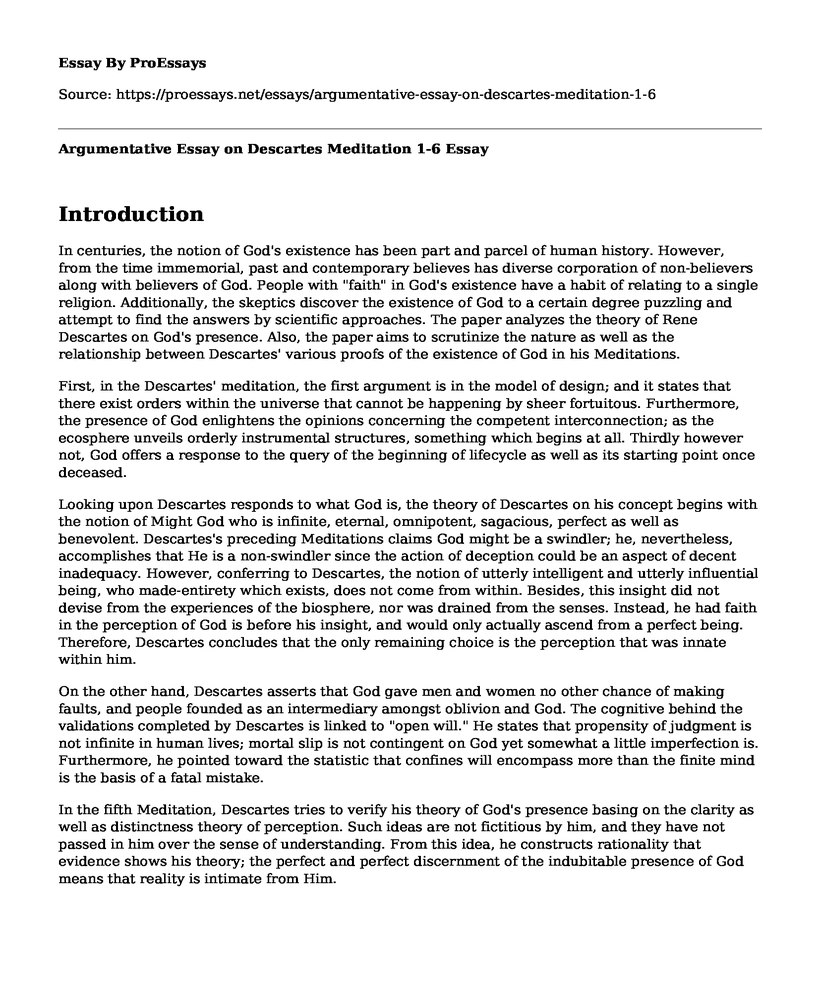Introduction
In centuries, the notion of God's existence has been part and parcel of human history. However, from the time immemorial, past and contemporary believes has diverse corporation of non-believers along with believers of God. People with "faith" in God's existence have a habit of relating to a single religion. Additionally, the skeptics discover the existence of God to a certain degree puzzling and attempt to find the answers by scientific approaches. The paper analyzes the theory of Rene Descartes on God's presence. Also, the paper aims to scrutinize the nature as well as the relationship between Descartes' various proofs of the existence of God in his Meditations.
First, in the Descartes' meditation, the first argument is in the model of design; and it states that there exist orders within the universe that cannot be happening by sheer fortuitous. Furthermore, the presence of God enlightens the opinions concerning the competent interconnection; as the ecosphere unveils orderly instrumental structures, something which begins at all. Thirdly however not, God offers a response to the query of the beginning of lifecycle as well as its starting point once deceased.
Looking upon Descartes responds to what God is, the theory of Descartes on his concept begins with the notion of Might God who is infinite, eternal, omnipotent, sagacious, perfect as well as benevolent. Descartes's preceding Meditations claims God might be a swindler; he, nevertheless, accomplishes that He is a non-swindler since the action of deception could be an aspect of decent inadequacy. However, conferring to Descartes, the notion of utterly intelligent and utterly influential being, who made-entirety which exists, does not come from within. Besides, this insight did not devise from the experiences of the biosphere, nor was drained from the senses. Instead, he had faith in the perception of God is before his insight, and would only actually ascend from a perfect being. Therefore, Descartes concludes that the only remaining choice is the perception that was innate within him.
On the other hand, Descartes asserts that God gave men and women no other chance of making faults, and people founded as an intermediary amongst oblivion and God. The cognitive behind the validations completed by Descartes is linked to "open will." He states that propensity of judgment is not infinite in human lives; mortal slip is not contingent on God yet somewhat a little imperfection is. Furthermore, he pointed toward the statistic that confines will encompass more than the finite mind is the basis of a fatal mistake.
In the fifth Meditation, Descartes tries to verify his theory of God's presence basing on the clarity as well as distinctness theory of perception. Such ideas are not fictitious by him, and they have not passed in him over the sense of understanding. From this idea, he constructs rationality that evidence shows his theory; the perfect and perfect discernment of the indubitable presence of God means that reality is intimate from Him.
Conclusion
In conclusion, from the above discussion, I disagree with it to say that it is not vibrant to mention human being can err. It indicates that God never definitely make a fault by creating a human being that has faculties which lack aptness. Therefore, with such, there is a possibility to say that God might be imperfect, and this is an inconsistency to Descartes' spat of God as a unique being.
Cite this page
Argumentative Essay on Descartes Meditation 1-6. (2022, Nov 30). Retrieved from https://proessays.net/essays/argumentative-essay-on-descartes-meditation-1-6
If you are the original author of this essay and no longer wish to have it published on the ProEssays website, please click below to request its removal:
- Essay on Meta-Ethical Thinking
- Approaches to Ethics Paper Example
- Notions of Human Nature Essay
- Research Paper Action Plan Code of Ethics of the Elementary School
- The Jacobs' Family Values Essay Example
- Essay Example on Self-Absorption: Detaching From Foreign Culture?
- Secure Health Records: Ensuring Patient Privacy and Safety - Paper Example







